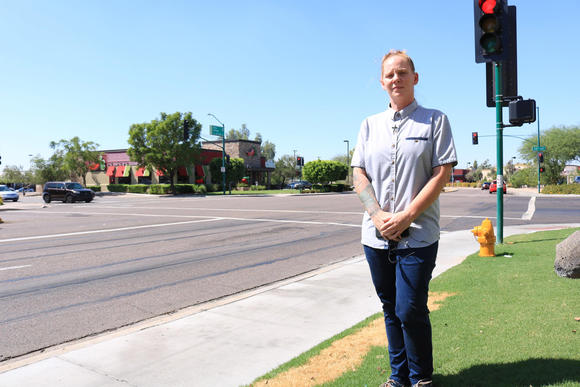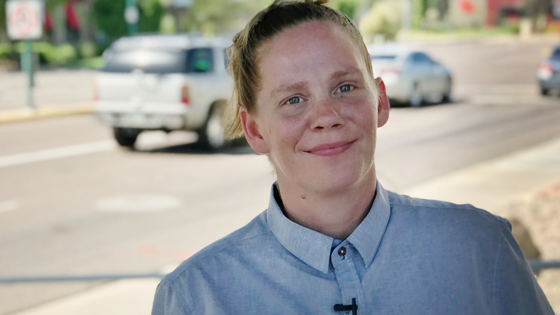Chili’s Denied Meagan Hunter a Promotion Because She Needed to ‘Dress More Gender Appropriate’


Meagan Hunter loved her job as a server at Chili’s Grill & Bar in Phoenix, Arizona — and she excelled at it. She was thrilled when her supervisors suggested that she apply for a new training program to become a manager.
In order to learn more about the opportunity, she attended a seminar on Chili’s Certified Shift Leader program. She wore a men’s button-up shirt, fitted slacks, and boat shoes — an outfit similar to what male managers at Chili’s wear. So she was surprised when her general manager told her that the district manager had seen her at the seminar and commented that she was “inappropriately dressed.”
Meagan tried to overlook the comment. But after she interviewed for the promotion, the general manager doubled down on the criticism of her clothes. “We really want to hire you,” he told her. “However, we need you to dress more gender appropriate.” Incredulous, she asked, “Are you telling me that I need to have my breasts hanging out to be successful in your company?” He responded, “Not in those words.”

When Meagan asked why she could not wear a chef-style coat like the one her general manager wore, he answered, “It’s for boys.”
Outraged and hurt by her general manager’s response, Meagan knew she couldn’t continue to work for Chili’s. She was forced to quit because she didn’t fit her boss’s idea of what a woman should look like.
READ MEAGAN'S STORY IN HER OWN WORDS
Meagan later learned that the same general manager had told her co-workers that he passed her over for a bartender position because he “didn’t want a gay girl behind the bar.” He said he didn’t think she would attract the “right kind” of clientele.
Meagan’s story is shocking, but it is far from unique. All too often, women and LGBTQ people are excluded from opportunities at work and school because they don’t look the part. In Meagan’s case, her boss told her she wouldn’t advance professionally because she did not look feminine enough. Yet on plenty of occasions, women and LGBTQ people face criticism if they dress in a manner that’s deemed too revealing or attractive. ACLU client Lizzy Martinez, for example, was kicked out of class and forced to cover her nipples with Band-Aids when she wore a loose t-shirt to school without a bra underneath. School officials told Lizzy that her nipples were “too distracting” to the boys in her class.
At every turn, women and girls are caught between contradictory rules about how they should dress and appear. Cover your breasts too much, and you’re told you won’t be able to attract customers. Leave your breasts too exposed, and you’re told you’re “distracting” to those around you.


%3Ciframe%20allow%3D%22accelerometer%3B%20autoplay%3B%20encrypted-media%3B%20gyroscope%3B%20picture-in-picture%22%20allowfullscreen%3D%22%22%20frameborder%3D%220%22%20height%3D%22315%22%20src%3D%22https%3A%2F%2Fwww.youtube.com%2Fembed%2Fa1dIvjwyl1I%3Fautoplay%3D1%26version%3D3%22%20thumb%3D%22https%3A%2F%2Fwww.aclu.org%2Fsites%2Fdefault%2Ffiles%2Fweb19-chilis-thumbnail-560x315.png%22%20width%3D%22560%22%3E%3C%2Fiframe%3E
Privacy statement. This embed will serve content from youtube.com.
Laws banning sex discrimination were supposed to put this problem to rest. In a landmark 1989 case, the Supreme Court ruled in favor of Ann Hopkins, a woman who was told her “professional” problems would be solved if only she would “walk more femininely, talk more femininely, wear make-up, have her hair styled, and wear jewelry.” The court recognized that Hopkins, a senior manager, was stuck between a rock and a hard place — out of a job because she was considered “macho” and out of a job if she wasn’t seen as macho enough.
That decision established that employers can’t punish employees because they don’t match stereotypical notions about how women or men should look and act. A growing number of lower courts have also recognized that federal law protects workers like Meagan who experience discrimination because of their sexual orientation.
Yet 30 years after Ann Hopkins’s case, Meagan still found herself out of a job because she didn’t fit her company’s stereotypes about what it means to be a woman. That’s why the ACLU today filed a charge of discrimination against Chili’s with the Equal Employment Opportunity Commission. When employers punish workers for who they are and what they look like, they lose valuable people like Meagan. That’s not only wrong and bad for business — it’s also against the law.

